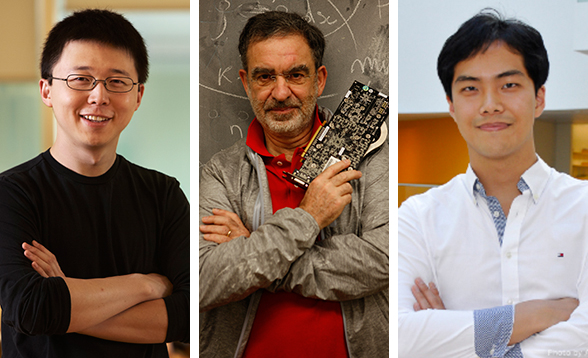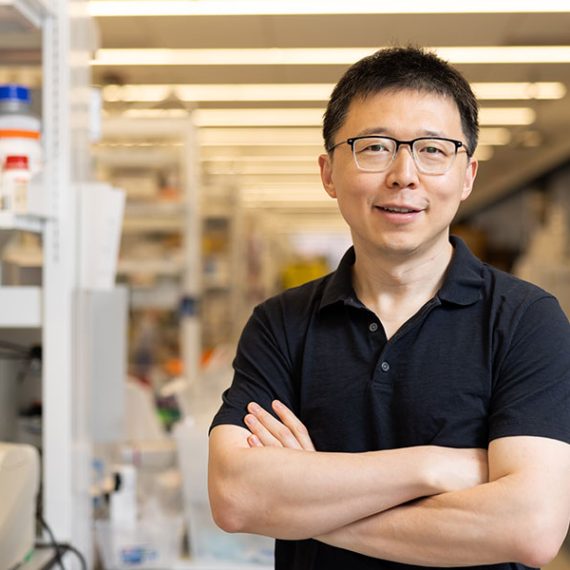MIT researchers to win awards from the Society for Neuroscience
Three neuroscientists at MIT have been selected to receive awards from the Society for Neuroscience.

Three neuroscientists at MIT have been selected to receive awards from the Society for Neuroscience (SfN).
Tomaso Poggio, a founding member of the McGovern Institute for Brain Research at MIT, will receive the Swartz Prize for Theoretical and Computational Neuroscience; Feng Zhang, a member of the McGovern Institute and an assistant professor in the Department of Brain and Cognitive Sciences, will receive the Young Investigator Award; and Sung-Yon Kim, a Simons postdoctoral fellow of the Life Sciences Research Foundation at MIT, will receive the Donald B. Lindsley Prize in Behavioral Neuroscience. The awards will be presented during Neuroscience 2014, the SfN’s annual meeting in Washington, D.C.
Swartz Prize for Theoretical and Computational Neuroscience
The $25,000 Swartz Prize for Theoretical and Computational Neuroscience, supported by the Swartz Foundation, recognizes an individual who has produced a significant cumulative contribution to theoretical models or computational methods in neuroscience.
“Dr. Poggio’s contributions to the development of computational and theoretical models of the human visual system have served to advance our understanding of how human systems learn from experience,” said Carol Mason, president of SfN. “It is an honor to recognize him as a founder and driving force in the field of computational neuroscience.”
Poggio, the Eugene McDermott Professor in the Department of Brain and Cognitive Sciences and the director of the Center for Brains, Minds and Machines, develops computational models of the brain to understand human intelligence. Specifically, he has developed models that mimic the ways that humans learn to recognize objects, such as faces, and actions, such as motion — applications now present in digital cameras and some cars. Poggio is currently working to develop more complex models that mimic the forward as well as feedback signals that the human brain uses during visual recognition. The ultimate goal of this research is to better understand how the brain works and to apply this technology to build intelligent machines.
Young Investigator Award
The SfN has also named two winners of this year’s Young Investigator Award: Feng Zhang of MIT and Diana Bautista of the University of California at Berkeley.
The $15,000 award recognizes the outstanding achievements and contributions by a young neuroscientist who has recently received his or her advanced professional degree.
“Drs. Zhang and Bautista are two young neuroscientists who have demonstrated remarkable dedication to their work,” Mason said. “Their creative research is advancing their respective fields, and their commitment to helping other scientists succeed is an inspiration to us all.”
Zhang, who is also a core member of the Broad Institute of MIT and Harvard and the W. M. Keck Career Development Professor in Biomedical Engineering, uses synthetic biology methods to study brain disease. As a graduate student at Stanford University, Zhang was instrumental in advancing the development of optogenetic technology, which allows researchers to manipulate genetically modified neurons with light. More recently, Zhang was a leader in the development of the CRISPR-Cas9 method for genome editing – a powerful new technology with many applications in biomedical research, including the potential to treat human genetic disease.
Donald B. Lindsley Prize in Behavioral Neuroscience
The SfN will award the Donald B. Lindsley Prize to Sung-Yon Kim, a postdoc in Kwanghun Chung’s lab at the Picower Institute for Learning and Memory.
Supported by The Grass Foundation, the prize recognizes an outstanding PhD thesis in the area of general behavioral neuroscience. Kim, who earned his PhD at Stanford University, used optogenetics to study the brain circuits underlying anxiety.
“The Society is pleased to honor Dr. Kim’s groundbreaking research in the neuroanatomical basis of anxiety behavior,” said Mason. “His approach to behavioral neuroscience will likely have a broad and lasting impact on biology and medicine.”




